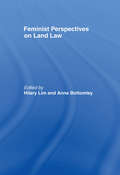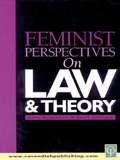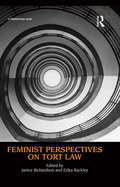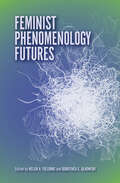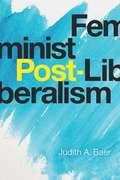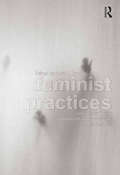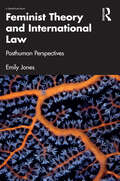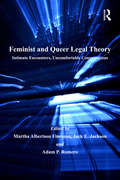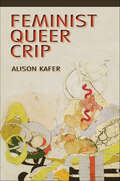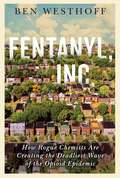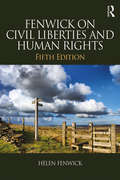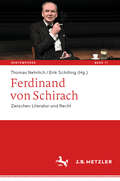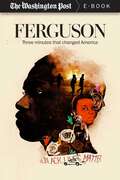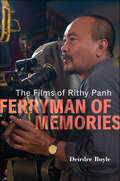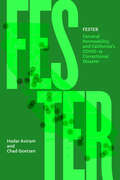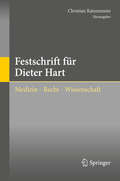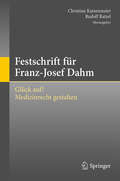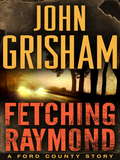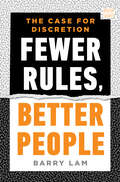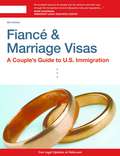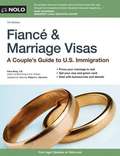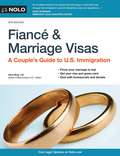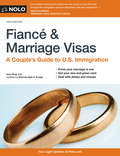- Table View
- List View
Feminist Perspectives on Land Law (Feminist Perspectives)
by Anne Bottomley Hilary LimThe first book to examine the critical area of land law from a feminist perspective, it provides an original and critical analysis of the gendered intersection between law and land; ranging land use and ownership in England and Wales to Botswana, Papua New Guinea and the Muslim world. The authors draw upon the diverse disciplinary fields of law, anthropology and geography to open up perspectives that go beyond the usually narrow topography and cartography of land law. Addressing an unorthodox variety of sites where questions of women's access and rights to land are raised, this book includes chapters on: shopping malls ancient monuments nature reserves housing estates the family home. An interdisciplinary and enlivening account of feminist perspectives on land law, it is an excellent addition to the bookshelves of students and researchers in legal studies, gender studies, social anthropology and social geography.
Feminist Perspectives on Law and Theory (Feminist Perspectives)
by Janice Richardson Ralph SandlandWhat is the link between the way in which women are viewed as an aberration within law - such that pregnant women initially had to be compared with sick men to claim unfair dismissal - and the view of women as monstrous within philosophy? This book uses the failure of women to fit within male models of both law and theory as a way to rethink legal questions,including the meaning of equality, freedom, justice and citizenship. This includes concern about the way in which queer theory and critical race theory - as well as issues of class - intersect with feminist theory today. It also raises issues about the relationship between political theory and practice and the productive intersection between debates within law, philosophy and feminism. This collection of essays on feminist legal theory therefore provides an interdisciplinary approach, drawn not only from law and philosophy, but also from cultural and womens studies. Feminism may still be on the margins of both law and philosophy, yet it has the ability to disrupt both. This book moves beyond a feminist critique of existing frameworks to the constructive project of reworking theory from within. It goes beyond debates of traditional jurisprudence to draw its tools from the growing body of work on feminist philosophy - including the writings of Luce Irigaray, Drucilla Cornell and Christine Battersby - which intersect both contemporary continental philosophy and critical legal theory.
Feminist Perspectives on Tort Law (Feminist Perspectives)
by Janice Richardson and Erika RackleyFeminist Perspectives on Tort Law offers a distinctly feminist approach to key topics in tort law. Ten original essays written by feminist legal scholars from the UK, US, Canada and Australia encompass a range of ways of thinking about women, tort law and feminism. The collection provides a fresh and original analysis of issues of long-standing concern to feminists as well as nascent areas of concern. These include conceptions of harm, constructions of reasonableness, the duty of care, the public/private divide, sexual wrongdoing, privacy and environmental law.Written with both scholars and students in mind, Feminist Perspectives on Tort Law is an important and timely addition to key debates in tort law..
Feminist Phenomenology Futures
by Helen A. Fielding and Dorothea E. OlkowskiDistinguished feminist philosophers consider the future of their field and chart its political and ethical course in this forward-looking volume. Engaging with themes such as the historical trajectory of feminist phenomenology, ways of perceiving and making sense of the contemporary world, and the feminist body in health and ethics, these essays affirm the base of the discipline as well as open new theoretical spaces for work that bridges bioethics, social identity, physical ability, and the very nature and boundaries of the female body. Entanglements with thinkers such as Heidegger, Merleau-Ponty, Beauvoir, and Arendt are evident and reveal new directions for productive philosophical work. Grounded in the richness of the feminist philosophical tradition, this work represents a significant opening to the possible futures of feminist phenomenological research.
Feminist Post-Liberalism
by Judith A. BaerFeminism and liberalism need each other, argues Judith Baer. Her provocative book, Feminist Post-Liberalism, refutes both conservative and radical critiques. To make her case, she rejects classical liberalism in favor of a welfare—and possibly socialist—post-liberalism that will prevent capitalism and a concentration of power that reinforces male supremacy. Together, feminism and liberalism can better elucidate controversies in American politics, law, and society. Baer emphasizes that tolerance and self-examination are virtues, but within both feminist and liberal thought these virtues have been carried to extremes. Feminist theory needs liberalism's respect for reason, while liberal theory needs to incorporate emotion. Liberalism focuses too narrowly on the individual, while feminism needs a dose of individualism. Feminist Post-Liberalism includes anthropological foundations of male dominance to explore topics ranging from crime to cultural appropriation. Baer develops a theory that is true to the principles of both feminist and liberal ideologies.
Feminist Practices: Interdisciplinary Approaches to Women in Architecture
by Lori A. BrownWomen continue to be extremely under-represented in the architectural profession. Despite equal numbers of male and female students entering architectural studies, there is at least 17-25% attrition of female students and not all remaining become practicing architects. In both the academic and the professional fields of architecture, positions of power and authority are almost entirely male, and as such, the profession is defined by a heterosexual, Eurasian male perspective. This book argues that it is vital for all architectural students and practitioners to be exposed to a diversity of contemporary architectural practices, as this might provide a first step into broadening awareness and transforming architectural engagement. It considers the relationships between feminist methodologies and the various approaches toward design and their impact upon our understanding and relationship to the built environment. In doing so, this collection challenges two conventional ideas: firstly, the definition of architecture and secondly, what constitutes a feminist practice. This collection of up-and-coming female architects and designers use a wide range of local and global examples of their work to question different aspects of these two conventional ideas. While focusing on feminist perspectives, the book offers insights into many different issues, concerns and interpretations of architecture, proposing through these types of engagement, architecture can become more culturally, politically and environmentally relevant. This 'next generation' of architects claim feminism as their own and through doing so, help define what feminism means and how it is evolving in the 21st century.
Feminist Theory and International Law: Posthuman Perspectives
by Emily JonesFeminist approaches to international law have been mischaracterised by the mainstream of the discipline as being a niche field that pertains only to women’s lived experiences and their participation in decision-making processes. Exemplifying how feminist approaches can be used to analyse all areas of international law, this book applies posthuman feminist theory to examine the regulation of new and emerging military technologies, international environmental law and the conceptualisation of the sovereign state and other modes of legal personality in international law. Noting that most posthuman scholarship to date is primarily theoretical, this book also contributes to the field of posthumanism through its application of posthuman feminism to international law, working to bridge the theory and practice divide by using posthuman feminism to design and call for legal change. This interdisciplinary book draws on an array of fields, including philosophy, queer and feminist theories, postcolonial and critical race theories, computer science, critical disability studies, science and technology studies, marine biology, cultural and media studies, Indigenous onto-epistemologies, critical legal theory, political science and beyond to provide a holistic analysis of international law and its inclusions and exclusions. This interdisciplinary book will appeal to students and scholars with interests in legal, feminist and posthuman theory, as well as those concerned with the contemporary challenges faced by international law.
Feminist and Queer Legal Theory: Intimate Encounters, Uncomfortable Conversations
by Martha Albertson Fineman Jack E. Jackson Adam P. RomeroFeminist and Queer Legal Theory: Intimate Encounters, Uncomfortable Conversations is a groundbreaking collection that brings together leading scholars in contemporary legal theory. The volume explores, at times contentiously, convergences and departures among a variety of feminist and queer political projects. These explorations - foregrounded by legal issues such as marriage equality, sexual harassment, workers' rights, and privacy - re-draw and re-imagine the alliances and antagonisms constituting feminist and queer theory. The essays cross a spectrum of disciplinary matrixes, including jurisprudence, political philosophy, literary theory, critical race theory, women's studies, and gay and lesbian studies. The authors occupy a variety of political positions vis-Ã -vis questions of identity, rights, the state, cultural normalization, and economic liberalism. The richness and vitality of feminist and queer theory, as well as their relevance to matters central to the law and politics of our time, are on full display in this volume.
Feminist, Queer, Crip
by Alison KaferIn Feminist, Queer, Crip Alison Kafer imagines a different future for disability and disabled bodies. Challenging the ways in which ideas about the future and time have been deployed in the service of compulsory able-bodiedness and able-mindedness, Kafer rejects the idea of disability as a pre-determined limit. She juxtaposes theories, movements, and identities such as environmental justice, reproductive justice, cyborg theory, transgender politics, and disability that are typically discussed in isolation and envisions new possibilities for crip futures and feminist/queer/crip alliances. This bold book goes against the grain of normalization and promotes a political framework for a more just world.
Fentanyl Nation: Toxic Politics and America's Failed War on Drugs
by Ryan HamptonA passionate call to abandon ineffective drug-war policies, reframe addiction as a public health issue, and end the Fentanyl crisis.The American overdose crisis has reached record-breaking heights; preventable overdoses are now responsible for more annual deaths than traffic accidents, suicide, or gun violence. Fentanyl—a potent, inexpensive, and easy-to-manufacture synthetic opioid—has thoroughly contaminated the drug supply, and while it frequently makes front page news across the country, it remains poorly understood by policymakers and the public. Why, despite all of our efforts to raise awareness and billions of dollars of investments, does this emergency keep getting worse?In Fentanyl Nation, recovery advocate Ryan Hampton separates the facts from the fiction surrounding Fentanyl, and shows how overdose deaths are ultimately policy failures. Instead of investing in education, harm reduction, effective treatment, and recovery, we have doubled down on more police, more incarceration, and harsher penalties for those caught in the grip of addiction. Yet history has shown time and time again that it is impossible to arrest our way out of a public health crisis; the government used the same strategy to fight the crack-cocaine epidemic of the 80s and 90s, and it only resulted in racially disparate policing and the destruction of marginalized communities.This urgent and informative manifesto reveals how prejudice, discrimination, and stigma have been codified into our drug laws, and calls for a compassionate and evidence-based approach that would address the core causes of addiction and save countless lives. We can end this crisis, but only if we get out of our own way.
Fentanyl, Inc: How Rogue Chemists are Creating the Deadliest Wave of the Opioid Epidemic
by Ben WesthoffA deeply human story, Fentanyl, Inc. is the first deep-dive investigation of an illicit industry that has created a worldwide epidemic, ravaging communities and overwhelming and confounding government agencies that are challenged to combat it. "A whole new generation of chemicals is radically changing the recreational drug landscape," writes Ben Westhoff. "These are known as novel psychoactive substances (NPS) and they include replacements for known drugs like ecstasy, LSD, and marijuana, as well as heroin. They are synthetic, made in a laboratory... and they are much more potent than traditional drugs"--and, tragically, all-too-often lethal. Drugs like fentanyl, K2, and Spice--and those with arcane acronyms like 25I-NBOMe--were all originally conceived in legitimate laboratories for proper scientific and medicinal purposes. Their formulas were then hijacked and manufactured by rogue chemists, largely in China, who change their molecular structures to stay one step ahead of the law, often making the drugs' effects impossible to predict. Westhoff has infiltrated this shadowy world. He tracks down the little-known scientists who invented these drugs and inadvertently killed thousands, as well as a mysterious drug baron who turned the law upside down in his home country of New Zealand. Westhoff is the first journalist ever to infiltrate a Chinese fentanyl lab. Working undercover, he gains entry to a pair of synthetic drug operations from which fentanyls and other NPS emanate, providing startling and original reporting on how China's vast chemical industry operates, and how the Chinese government subsidizes it. He poignantly chronicles the lives of addicted users and dealers, families of victims, law enforcement officers, and underground drug awareness organizers in the U.S. and Europe. Together they represent the shocking and riveting full anatomy of a calamity we are just beginning to understand. From its depths, as Westhoff relates, are emerging new strategies that may provide essential long-term solutions to the drug crisis that has affected so many.
Fenwick on Civil Liberties & Human Rights
by Richard Edwards Helen FenwickMore than merely describing the evolution of human rights and civil liberties law, this classic textbook provides students with detailed and thought-provoking coverage of the most crucial developments in the field, clearly explaining the law in context and practice. Updated throughout for this new edition, Fenwick on Civil Liberties and Human Rights considers a number of recent major changes in the law – in particular proposals to replace the Human Rights Act with a British Bill of Rights, and the Counter-Terrorism and Security Act 2015 – whilst also contextualising the impact of reforms on hate speech and contempt due to advances in new media. Comprehensive and authoritative, this textbook offers an essential resource for students on human rights or civil liberties courses, as well as a useful reference for students and scholars of UK Public Law.
Ferdinand von Schirach: Zwischen Literatur und Recht (Kontemporär. Schriften zur deutschsprachigen Gegenwartsliteratur #17)
by Erik Schilling Thomas NehrlichFerdinand von Schirach war lange Strafverteidiger, bevor er mit dem Erzählband Verbrechen einen sensationellen Debüterfolg feierte. Seither hat er ein umfangreiches und vielfältiges literarisches Werk veröffentlicht. Mit über 10 Millionen verkauften Büchern und Übersetzungen in über 40 Ländern gehört Schirach zu den meistgelesenen deutschen Gegenwartsautoren. Wie erklärt sich dieser Erfolg? Was zeichnet seine Texte aus, ästhetisch, diskursiv und politisch? Die im vorliegenden Band versammelten Beiträge untersuchen Schirachs Werk aus literatur-, kultur- und rechtswissenschaftlicher Perspektive: seine Poetik, seine Medien und vor allem seine Verbindung von Literatur und Recht.
Ferguson: Three Minutes that Changed America
by Wesley Lowery The Washington PostFrom the Pulitzer Prize winning Washington Post comes a meticulously detailed, insightful report on the killing that brought the nation's attention to a city coming apart at the seams. 12:00PM: Officer Darren Wilson turns his Chevy Tahoe police cruiser left on Canfield Drive. 12:01PM: Wilson orders two young men, Dorian Johnson and Michael Brown, to get out of the street. 12:04PM: Michael Brown lays dying from bullet wounds. Three minutes in middle America shook a nation to its foundation. To many, it shone a spotlight on the frequently violent, often deadly interactions between young men of color and police departments. It highlighted the racial disparity in policing techniques, in response to crime, and in how race relations are perceived in an America where many incorrectly pride the country on being "post-racial." Renowned journalist Wesley Lowery has pulled together a vast and troubling panorama of reportage on the Ferguson slaying, and the aftermath--the marches, the clashes, and the slow, painful process of building trust between a devastated community and a police department tasked with serving and protecting it. Challenging and necessary, Ferguson engages America in a frank and necessary dialogue about race relations, about legacies of bigotry that continue to this day, and about a path forward as one nation, equal under the law. Contributors include: Joel Achenbach, Mark Berman, Lindsey Bever, Jeremy Borden, Amy Brittain, DeNeen L. Brown, Philip Bump, Jessica Contrera, Jahi Chikwendiu, Niraj Chokshi, Robert Costa, Alice Crites, David A. Fahrenthold, Darryl Fears, Marc Fisher, J. Freedom du Lac, Thomas Gibbons-Neff, Chico Harlan, Dana Hedgpeth, Peter Hermann, Scott Higham, Peter Holley, Sari Horwitz, Greg Jaffe, Sarah Kaplan, Kimbriell Kelly, Kimberly Kindy, Sarah Larimer, Carol D. Leonnig, Jerry Markon, Michael E. Miller, David Montgomery, Brian Murphy, David Nakamura, Abby Phillip, Steven Rich, Manuel Roig-Franzia, Robert Samuels, Sandhya Somashekhar, John Sullivan, Julie Tate, Krissah Thompson, Neely Tucker.
Ferryman of Memories: The Films of Rithy Panh
by Deirdre BoyleFerryman of Memories: The Films of Rithy Panh is an unconventional book about an unconventional filmmaker. Rithy Panh survived the Cambodian genocide and found refuge in France where he discovered in film a language that allowed him to tell what happened to the two million souls who suffered hunger, overwork, disease, and death at the hands of the Khmer Rouge. His innovative cinema is made with people, not about them—even those guilty of crimes against humanity. Whether he is directing Isabelle Huppert in The Sea Wall, following laborers digging trenches, or interrogating the infamous director of S-21 prison, aesthetics and ethics inform all he does. With remarkable access to the director and his work, Deirdre Boyle introduces readers to Panh’s groundbreaking approach to perpetrator cinema and dazzling critique of colonialism, globalization, and the refugee crisis. Ferryman of Memories reveals the art of one of the masters of world cinema today, focusing on nineteen of his award-winning films, including Rice People, The Land of Wandering Souls, S-21: The Khmer Rouge Killing Machine, and The Missing Picture.
Fester: Carceral Permeability and California's COVID-19 Correctional Disaster
by Hadar AviramThe mismanagement of the COVID-19 pandemic in California’s prisons stands out as the state’s worst-ever medical catastrophe in a carceral setting. Fester offers a cultural history of this correctional disaster through first-person accounts, courtroom observations, policy documents, and years of carefully collected quantitative data. Bearing witness to the immense suffering wrought on people behind bars through dehumanization, fear, and ignorance, Fester explains how carceral cruelty also threatens the health and well-being of all Californians. This book stands as a monument to the brave coalition of incarcerated and formerly incarcerated people and their loved ones, along with activists, doctors, journalists, and lawyers, who fought to shed light on one of the darkest times in the Golden State’s correctional system.
Festering Lilies (Ulverscroft Large Print Ser.)
by Natasha CooperWillow King, 38 years old and plain, with a safe job at the Department of Old Age Pensions--and a secret. When handsome, high-flying Algernon Endelsham, Minister of the DOAP is battered to death on Clapham Common, Willow’s colleagues think that she killed him: will the police agree with them? Willow must find her way through a web of emotions and motives to find the real murderer before her non-existent alibi is checked, and her secret is discovered.
Festschrift für Dieter Hart: Medizin - Recht - Wissenschaft
by Christian KatzenmeierDie Festschrift ehrt das medizinrechtliche Lebenswerk von Dieter Hart. Die Bandbreite der Themen spiegelt die Vielschichtigkeit der Forschungsgebiete des Jubilars. Schwerpunkte sind das Arzthaftungs- und Organisationsrecht, medizinisches Erprobungshandeln, Evidenzbasierte Medizin und Health Technology Assessment, Ärztliche Leitlinien, Beziehungen von Haftungs- und Sozialrecht, Arzneimittelrecht, Verbraucher- und Patientenschutzrecht, Wettbewerbsrecht, Medizinschadensforschung und Haftung. Führende Vertreter verschiedener Fachrichtungen analysieren zentrale Fragestellungen und zeigen aktuelle Entwicklungen auf.
Festschrift für Franz-Josef Dahm
by Rudolf Ratzel Christian KatzenmeierDie Festschrift ehrt das medizinrechtliche Lebenswerk von Franz-Josef Dahm. Die Bandbreite der Themen spiegelt die Vielschichtigkeit dieses Rechtsgebiets wieder: Vertragsarzt- und Berufsrecht, Patientenrechte, Haftungsrecht, Gesellschaftsrecht, Disziplinar- und Strafrecht, das Recht der Selbstverwaltung sowie Krankenhausrecht. Die Festschrift ist eine Fundgrube für all diejenigen, die sich ein Bild von aktuellen medizinrechtlichen Fragestellungen verschaffen wollen.
Fetching Raymond: A Story from the Ford County Collection
by John GrishamA riveting story of suspense from John Grisham&’s #1 New York Times bestseller, Ford County—now available as a standalone eBook short Wheelchair-bound Inez Graney and her two older sons, Leon and Butch, take a bizarre road trip through the Mississippi Delta to visit the youngest Graney brother, Raymond, who&’s been locked away on death row for eleven years . . . and it could well be their last visit. Going back to Ford County, Mississippi, the setting of his first novel, A Time to Kill, Grisham brings the Graneys and their world to vivid and colorful life, making it abundantly clear why he is our most popular storyteller. Includes an excerpt from John Grisham&’s classic thriller, A Time to KillDon&’t miss John Grisham&’s new book, THE EXCHANGE: AFTER THE FIRM!
Fewer Rules, Better People: The Case for Discretion (A Norton Short)
by Barry LamA philosopher argues that the proliferation of rules and mandates is making us dumber, less moral, more deceptive, and less able to govern important institutions. Wherever there’s a rule, there is someone with the power to apply or ignore it—or add to it, in the interest of justice. From enforcing chores to issuing life sentences, decision-makers deliver flawed and sometimes arbitrary outcomes. But is their use of discretion good or bad overall? As a society, should we seek to minimize or maximize discretion, with all its potential for bias and other kinds of human error? Reframing our understanding of justice and ethics, philosopher Barry Lam argues that while use of discretion—whether by a sports referee, a parent, a police officer, or a judge—can never be perfect, removing it has even more problematic effects. Mandatory arrests and sentencing laws have not eliminated bias, but have corrupted the courtroom, institutionalized lying, and brought about even more unjust and arbitrary results. Fewer Rules, Better People is a bold, riveting treatise that sheds new light on political debates about law and justice while aiming to prepare us for the imminent threat of more “perfect,” discretion-less rule enforcement by AI.
Fiance and Marriage Visas
by Ilona Bray JdYou're engaged or married to a U.S. citizen or permanent resident, and all you want is the right to be together in the U.S. Should be easy, right? It's not. Information can be hard to find, the government bureaucracy isn't helpful, delays are inevitable. Fortunately, this easy-to-use guide puts all the information you need in one place. Fiancé & Marriage Visas makes obtaining a visa and green card as painless as possible. It helps you make sure you're truly eligible and decide the fastest and best application strategy -- whether you're married or unmarried, living in the U.S. or overseas. With this friendly, comprehensive book, you can: make sure you won't face barriers to immigrating plan the best application strategy make your way through the bureaucracy collect, prepare, and manage forms and paperwork prepare for meetings with U.S. officials learn how to prove your marriage is real deal with the two-year testing period find out what to do if your application is denied Plus, Fiancé & Marriage Visas gives you helpful advice on protecting and renewing your green-card status. It also provides samples of essential forms to guide you, and shows you how to find them online. This edition is updated with tips for immigrating same-sex couples, new guidance on the provisional waiver of unlawful presence, the latest financial requirements for sponsors, and more.
Fiancé & Marriage Visas
by Ilona Bray J.D.Obtain a visa and stay with your spouse in the U.S. You're engaged or married to a U.S. citizen or permanent resident, and all you want is the right to be together in the U.S. Should be easy, right? It's not. Information can be hard to find, the government bureaucracy isn't helpful, delays are inevitable. Worst of all, there hasn't been an easy-to-use guide through the process -- until now. Fiancé & Marriage Visas makes obtaining a visa and green card as painless as possible. It helps you make sure you're truly eligible and decide the fastest and best application strategy -- whether you're married or unmarried, living in the U.S. or overseas. With this friendly, comprehensive book, you can: understand the immigration process adopt the best application strategy make your way through the bureaucracy collect, prepare, and manage paperwork prepare for meetings with U.S. officials learn how to prove your marriage is real deal with the two-year testing period find out what to do if your application is denied Plus, Fiancé & Marriage Visas gives you helpful advice on protecting and renewing your green-card status. It also provides samples of essential forms to guide you, and shows you how to find them online. This edition is updated with new financial requirements for sponsors, and provides additional information to help you cost-compare your visa options and prove the validity of your marriage. Plus, you'll get up-to-date sponsorship and application requirements.
Fiancé and Marriage Visas: A Couple's Guide to U.S. Immigration
by Ilona BrayObtain a visa and stay with your spouse in the U.S. You're engaged or married to a U.S. citizen or permanent resident, and all you want is the right to be together in the U.S. Should be simple, right? It's not. The pile of application forms can be overwhelming, the bureaucracy isn't helpful and delays are inevitable. But the good information in this book will help you succeed. Fiancé & Marriage Visas makes obtaining a visa and green card as painless as possible. It helps you make sure you're truly eligible and decide the fastest and best application strategy -- whether you're married or unmarried, living in the U.S. or overseas. With this friendly, comprehensive book, you can: discover the fastest and best application strategy avoid common - and serious - mistakes prepare for meetings with officials prove your marriage is real - not a fraud deal with the two-year testing period for new marriages. Plus, Fiancé & Marriage Visas gives you helpful advice on protecting and renewing your green-card status. It also provides samples of essential forms to guide you, and shows you how to find them online. This edition covers the new provisional waiver opportunity, the availability of same-sex marriage-based visas, and changes to application processes. It also provides checklists and sample forms throughout.
Fiancé and Marriage Visas: A Couple's Guide to U.S. Immigration
by Ilona BrayThe book that’s helped thousands of couples around the world You’re engaged or married to a U.S. citizen or permanent resident, and all you want is the right to be together in the United States. Should be simple, right? It’s not. The pile of application forms can be overwhelming, the bureaucracy isn’t helpful, and delays are inevitable. This book will help you succeed. Discover the fastest and best application strategy. Avoid common—and serious—mistakes. Prepare for meetings with officials. Prove your marriage is real—not a fraud. Deal with the two-year testing period for new marriages. The 10th edition covers the Trump travel ban on citizens of certain countries, changes to fees and application processes, as well as heightened scrutiny for visa fraud. It also provides checklists and sample forms throughout. Use this book if you are living in the United States or overseas and: your fiancé is a U.S. citizen your spouse is a U.S. citizen, or your spouse is a U.S. permanent resident.
